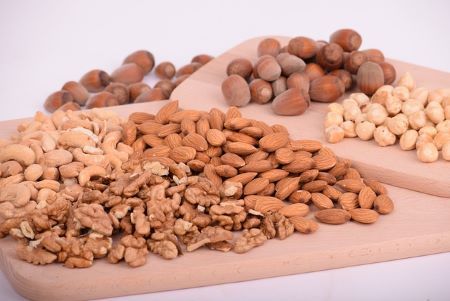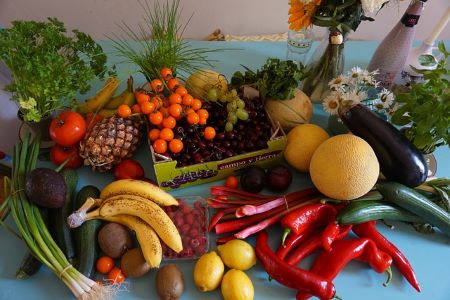This is the diet yoga prescribes – and here’s what you need to know about it to achieve balance for mind, body, and plate.
Everybody eats. It’s an indisputable part of human experience that binds us all together. Our bodies need food to provide nutrients for cellular repair and metabolism; immunity against bugs and diseases; and as fuel to help us get out of bed every day and do the things we enjoy! The importance of food within the body stems back to when it was identified by our ancestors.

Far transcending primordial survival needs, food adapted a different role. In many cultures and societies, it was used for medicinal properties, with a tonic to cure any ail. For others, what they ate became a medium to reconnect to the universe, via way of the earth.
Food has long been in the orbit of discussion and debate in the theological fields and spiritual realms. Many lineages of religion observe periods of fasting and austerity, while others proscribe particular provender for the purpose of purity and piety.
Yoga is no exception. For thousands of years, yogis have fostered food as an avenue for channelling spirituality and achieving ultimate enlightenment. From the elemental heart of Ayurveda to abstemious periods that teach the raw, primordial value of food, yogis are distinct diet disciples. But underneath the many cloaks shrouding their approach to eating – from ayurveda to raw vegan and clean eating – there is a simple, nutritious approach to feed both body and soul.
Vital Energy
Since the philosophy of yoga attributes energy as the thread that weaves the universe together, it is understandable that the notion of diet is sewn into the yogic tapestry – forming a link in the chain of achieving enlightenment.
The yogic approach to nourishing the body relies on energy that comes from the sun, believing that the closer we can eat to the source, the more vital our own energy and bodies will be. But humans can’t produce energy directly from the sun; scientifically, we can only synthesise vitamin D. Plants, on the other hand, can assimilate energy directly from the sun by way of photosynthesis. With this, yoga attributes a wholly vegetarian, plant-based diet as the optimal way to eat and sustain vitality and health.

Philosophically, a vegetarian diet aligns with the ethic of non-violence, (ahimsa). But, because plants grow under the sun, absorbing energy directly from the primary source of energy within the universe. This paves an avenue for ingesting energy from a secondary source, with the frequency still high and the quality of the food valuable to our bodies. Whereas eating animal flesh provides a third-hand source of energy, depleted of nutritional value and a stagnant, low frequency.
Complete Nutrition
Food has many important micro and macro nutrients, used by the body for its energy and survival. With the yogic approach to diet, all key constituents are obtained from whole, vegetarian foods offering a complete profile of vital nutrition.
Fibre
Fibre is crucial for physical health. It acts as a medium for transporting waste through our digestive systems – toxins, waste hormones, etc. It also feeds the millions of microbes in our guts, known as the microbiome, which is essential for many health systems, including immunity and mental health.
Fibre is not available to us in meat, but it is abundant in a vegetarian diet. It is the indigestible portion of plant foods and comes in two forms: soluble and insoluble.
Soluble fibre dissolves in water, whereas insoluble doesn’t. Most plant foods contain both types of fibre in different amounts. When we eat fibre-rich foods, the soluble fibre will dissolve in the digestive tract, forming a type of gel. This gelatinous substance supports digestive health in many ways. It also contributes to cholesterol reduction and blood glucose control. On the other hand, insoluble fibre passes swiftly through the digestive tract, unscathed, drinking up water as it goes. This helps to form soft stool, promoting easy, regular excretions, essential for bowel health.

Having a significant effect on the body, fibre is crucial for our health. It acts as a cleaning sponge, mopping up mess made by our physiological systems. Fibre is plentiful from a variant source of plant foods:
- Oats and whole cereal grains
- Wholegrain bread
- Dried fruits (apricots, raisins and figs)
- Fresh fruits (blueberries, raspberries, apples, bananas, mangoes, pineapples…)
- Fresh vegetables (carrots, broccoli, cauliflower, potatoes, butternut squash…)
- Peas, beans and legumes (chickpeas, lentils, kidney beans, black beans)
Protein
One of the most common concerns about a vegetarian diet is the availability of protein. A very slim percentage of the Western population is protein deficient. Often, government guidelines to how much protein we need are generalised and overestimate our requirements. On average, it is 1g of protein to 1kg of body weight. Most people are in fact eating double what they really need. Whilst protein is imperative for building tissues and repairing cellular damage, too much from the wrong sources can have deleterious effects.
Protein contain nitrogen and, when synthesised in the body, they produce nitrogenous waste. Eliminating this waste from the body is taxing on the kidneys. Animal sources of protein produce more nitrogenous waste than plant sources, thus putting more strain on these vital organs.
In a vegetarian, plant-based diet, protein is widely available. And the sources of protein contain many of the other macronutrients, like fibre and fat, which our bodies need to thrive. Since proteins are formed from building blocks, known as amino acids, it is important to eat a range of plant-based proteins to ensure the full quorum is consumed.
- Seeds (such as pumpkin, sunflower, flax and hemp)
- Nuts (such as almonds, walnuts, cashews and Brazil nuts)
- Peas, beans, and legumes (chickpeas, lentils, kidney beans, black beans)
- Dairy products (such as feta cheese and Greek style natural yoghurt)
- Hen eggs
- Grains (like quinoa)
All vegetables also contain certain amounts of protein. This is how animals, including us, are able to eat plants and tubers and still produce enough protein to build healthy bodies.
Carbohydrates
Carbohydrates are the chemical compound of energy that plants store. They are made up of Carbon, Oxygen, and Hydrogen molecules. Carbohydrates are the bodies primary and preferred source of fuel in the body – particularly our calorie-burning brains (which use around 500 calories per day). They are also closely related to fibre in many ways. They also come in two forms: simple and complex.
Simple carbohydrates are refined and often referred to as ‘white’. The fibre has been stripped from these foods and they are quickly digested by the body. Energy is stored much quicker than that of complex carbohydrates. It is the complex carbohydrate foods that contain dietary fibre. Many carbohydrates are broken down into sugar in the body, providing us with essential energy. But this shouldn’t be confused with sugary foods like sweets and alcohol. These foods have slim nutrient profiles and are rapidly broken down into glucose in the body. Whereas complex carbohydrates, like potatoes, wholegrains, fruits, and vegetables, are broken down more slowly and the energy production (glucose) in the body is slower – keeping us going for longer!
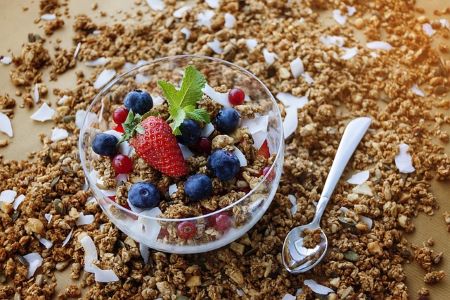
- Oats and other cereal grains
- Wholegrain bread
- Dried fruits (apricots, raisins and figs)
- Fresh fruits (blueberries, raspberries, apples, bananas, mangoes, pineapples…)
- Fresh vegetables (carrots, broccoli, cauliflower, potatoes, butternut squash…)
- Peas, beans and legumes (chickpeas, lentils, kidney beans, black beans)
- Pasta and rice
- Other grains (like cous cous)
Fats
While many people have spent decades eliminating fat from their diets, it is an essential part of our diets – even in the yogic approach. Dietary fat facilitates the absorption of some vitamins – A, D, E, and K – and helps our nerves function efficiently.
Fat comes in several different forms: trans fats, saturated fats, polyunsaturated fats, and monounsaturated fats. However, they aren’t all created equally. Trans fats and saturated fats are predominantly found in animal foods. Trans fats are also in many processed baked and packaged goods. While some plant foods have saturated fats, like coconut oil and milk, there are very few sources. Trans fats have a damaging effect on health and should be avoided as much as possible. Saturated fat can be consumed in small amounts but consider the source and what other nutrients you might be able to obtain simultaneously.
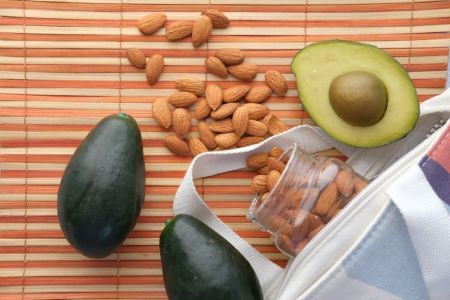
Polyunsaturated and monounsaturated fats are important to human health and form part of a balanced diet. They are found in a variety of plant-based and vegetarian foods:
- Avocados
- Nuts and seeds
- Olives
- Beans (such as soya)
- Unfiltered oils (olive oil and avocado oil)
Vitamins & Minerals
Essential to healing the body, vitamins and minerals are organic compounds found abundantly in a variety of vegetarian foods. Conducive to fighting infections, healing wounds, strengthening tissues and bone, regulating hormones, and so much more; these miniscule mixtures of matter are more important than you might realise.
The key vitamin groups we need to keep our bodies functioning are:
- Vitamin A – also known as retinol. It has several important functions, including fortifying the body’s natural defences and immunity, maintaining skin health and function, and supporting the function of the eyes. Retinol is largely found in animal products, and the yogic diet recommends small amounts of cheese and other low-fat dairy. However, the yogic approach prizes plant foods and vitamin A in the form of beta-carotene is plentiful in brightly coloured fruits and vegetables. Mangoes, papayas, apricots, carrots, sweet potatoes, and bell peppers are rich sources of beta-carotene, which the body assimilates into retinol.
- B-Vitamin complex consists of eight forms of vitamin B. Each can be found in various animal and plant-based foods. Together, they work to maintain healthy skin, vision, and nervous system. They also support the body to break down food and release it as energy to our cells. Some b-vitamins, like pyridoxine (B6) and cyanocobalamin (B12), also help the body to produce haemoglobin, or make fatty acids, like folate, (B7). Some b-vitamins also help the body store protein or use other b-vitamins. It’s best to eat a variety of yoga approved b-vitamin sources to ensure the whole complex is included in your diet. Rich sources of b-vitamins include leafy green vegetables, dairy products, eggs, wholegrains, avocados, mushrooms, nuts, soybeans (or edamame), bananas, broccoli, peas, chickpeas, and kidney beans.
- Vitamin C is known as a tonic to cure the common cold, but it actually has a much bigger role in the body. An active participant in keeping healthy collagen levels, vitamin C protects our cartilage, as well as bones, skin, and blood vessels. It also supports wound healing. When we think about sources of vitamin C, we rightly go straight to citrus fruits like oranges, grapefruits, and lemons. But broccoli and other leafy greens are great sources, along with berries and potatoes.
- Vitamin D regulates our body’s calcium and phosphate levels. These are important minerals that keep bones, teeth, and muscles healthy. Fortunately, we can obtain this vitamin straight from the sun – heaven. But our busy lives mean we aren’t out in the sun enough and our ongoing battle against skin cancer means we’re covered up when we do. So, all year round, it is recommended that we take a supplement. However, there are some vegetarian sources of vitamin D, including eggs, chestnut mushrooms, and some fortified breakfast cereals.
- Vitamin E is important for skin and eye health and supports a healthy immune system. Good yogi sources include olive oil and rapeseed oil, nuts and seeds, avocados, and wheatgerm.
- Vitamin K contributes to bone health and can be found in green leafy vegetables, like spinach, kale, and broccoli, as well as cereal grains and vegetable oils.
Minerals are trace elements that form in various parts of the earth. The key minerals we need in our diets can also be found in a wide variety of vegetables, nuts, seeds, legumes, pulses, and beans, as well as wholegrains and small amounts of dairy products. These include:
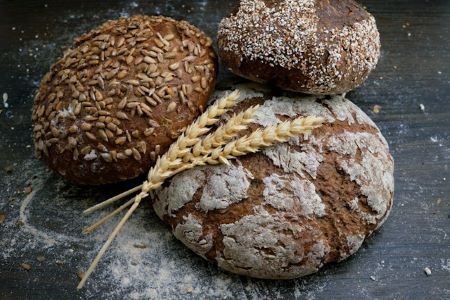
- Calcium: for healthy bones and teeth
- Chromium: supports a healthy heart and brain, as well as maintains healthy skin
- Iodine: to regulate thyroid hormones and metabolic rate
- Iron: for making red blood cells, which transport oxygen around the body
- Selenium: important for the immune system, it also contributes to healthy fertility and prevents damage to cells and tissues
- Potassium: an electrolyte, it helps the body to balance fluids and helps the heart to function properly
- Sodium: another electrolyte, it joins potassium in regulating fluids in the body
- Magnesium: for energy production and healthy bones.
- Manganese: helps to activate enzymes in the body – which are responsible for chemical reactions, like breaking down food
- Phosphorous: builds strong bones and teeth, as well as releasing energy from food
- Zinc: supports the immune system, helps the body heal wounds, makes new cells and enzymes, and processes carbohydrates, proteins, and fats in food
Time to Pause
Slightly controversial, but part of the yogic approach to diet includes periods of fasting. Claiming to facilitate overall health, while simultaneously opening the door to enlightenment, fasting is heralded as an opportunity to free the body from the arduous process of eating and digesting; liberating it to enjoy other pursuits and find stillness in an undistracted mind. Fasting is a common theme amongst many religions and holds great spiritual value. But it shouldn’t be approached lightly, especially if you have never fasted before.

The yogic approach recommends fasting on quieter days when you can be less active and more reflective. While the duration is not set in stone, most texts recommend no longer than 2 days. The fast can then be broken incrementally over several days where different foods are introduced in a specific order, (from raw foods, building back up to your regular diet).
Most importantly, modern yoga literatures offer up sage words of wisdom on who fasting might not be suitable for. If it is something you’re curious about and you have a balanced relationship with food and your body, fasting for 24 hours should be ok. Otherwise, give the yogic, vegetarian approach to nutrition a go and feel the health benefits open up new avenues for you on and off your mat.


